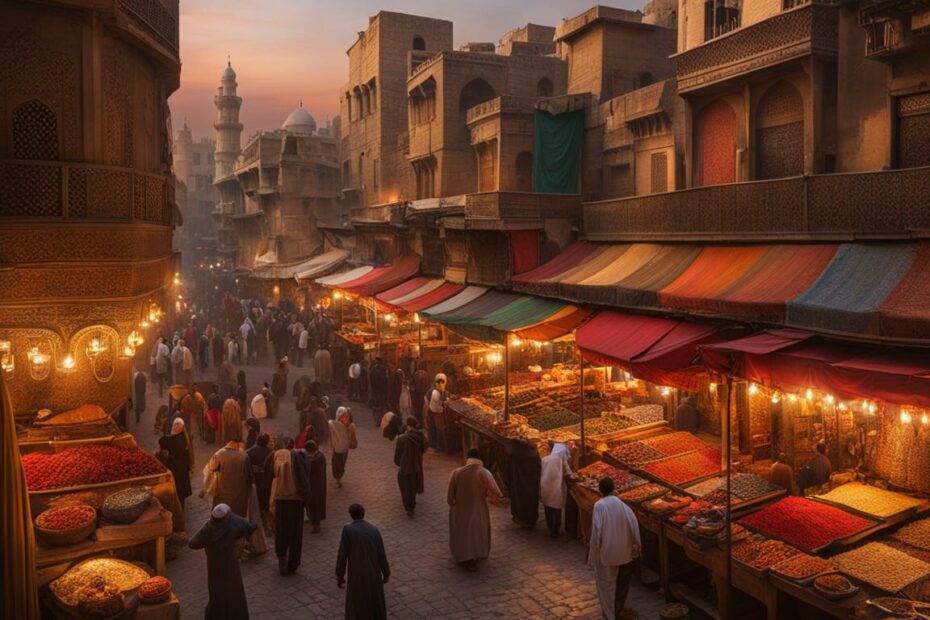Khan El Khalili, located in Cairo, Egypt, is a historic bazaar that offers a cultural shopping experience like no other. As a designated tourist attraction in Cairo, this Middle Eastern market is renowned for its traditional crafts, making it a must-visit destination for those seeking a glimpse into Cairo’s rich history. Nestled in the heart of Islamic Cairo, Khan El Khalili has thrived as a historic trading hub for centuries.
The Legacy of Emir Djaharks el-Khalili: Founding the Bazaar
Khan El Khalili Bazaar, one of Cairo’s most iconic landmarks, has a rich history that dates back to the 14th century. The bazaar was founded by Emir Djaharks el-Khalili, a prominent figure who established it as a bustling trading hub for merchants from Egypt and around the world.
The Need for a Trading Hub in 14th Century Cairo
In the 14th century, Cairo was a thriving city known for its economic prosperity and strategic location. However, there was a need for a central marketplace where merchants could come together to exchange goods and foster trade. Emir Djaharks el-Khalili recognized this need and envisioned Khan El Khalili as the ideal solution.
Expansion and Flourishing under Sultan Qansuh al-Ghawri
Under the rule of Sultan Qansuh al-Ghawri, Khan El Khalili experienced a period of expansion and growth. The sultan added more shops and features to the bazaar, attracting an even larger number of merchants and visitors. During this time, Khan El Khalili became not only a trade hub but also a vibrant cultural center.
Restoration After Napoleon’s Invasion: A New Chapter
In the early 19th century, Napoleon Bonaparte invaded Egypt and brought significant changes to the region. Khan El Khalili Bazaar was not spared from the chaos of the invasion, but it was restored and rejuvenated after Napoleon’s departure. The restoration breathed new life into the bazaar, marking a new chapter in its history as it continued to thrive as a center of trade and commerce.
Today, Khan El Khalili stands as a testament to its historical importance and enduring legacy. Its cultural significance, architectural beauty, and vibrant atmosphere make it a must-visit destination for both locals and tourists alike.
Cultural Significance of Khan El Khalili’s Location
Khan El Khalili’s location within Islamic Cairo holds immense cultural significance, as it is at the heart of the city’s historic and religious heritage. Nestled in the bustling streets of Old Cairo, this iconic bazaar stands as a testament to the rich traditions and diverse influences that have shaped the region for centuries.
Why Khan El Khalili is the Heart of Islamic Cairo
Khan El Khalili is not just a marketplace; it is a vibrant reflection of the deep-rooted Islamic culture that permeates the city. The bazaar has long been a hub of trade, bringing together merchants and craftsmen from across Egypt and the Middle East. Its historical and architectural marvels, such as the Al-Hussein Mosque, Al-Azhar, and Wekalet El Ghouri, pay tribute to the Islamic heritage that thrives in this storied place.
The Geographical Advantage of the Bazaar’s Position
Strategically located, Khan El Khalili enjoys a geographical advantage that has contributed to its enduring status as a prominent historical site. Situated at the crossroads of important trade routes, the bazaar has served as a gateway to Africa, Asia, and Europe. Its position as a trading center facilitated the exchange of goods, ideas, and cultures, making it a melting pot of diverse influences.
A Hub that Has Stood the Test of Time
Throughout its long history, Khan El Khalili has remained an enduring hub, drawing in locals and tourists alike with its timeless allure. While modernization and globalization have shaped the world around it, this historical market has managed to preserve its authentic charm and serve as a link to the past. Its atmospheric alleys continue to captivate visitors, offering a nostalgic journey through time and an unbroken connection to the city’s vibrant past.
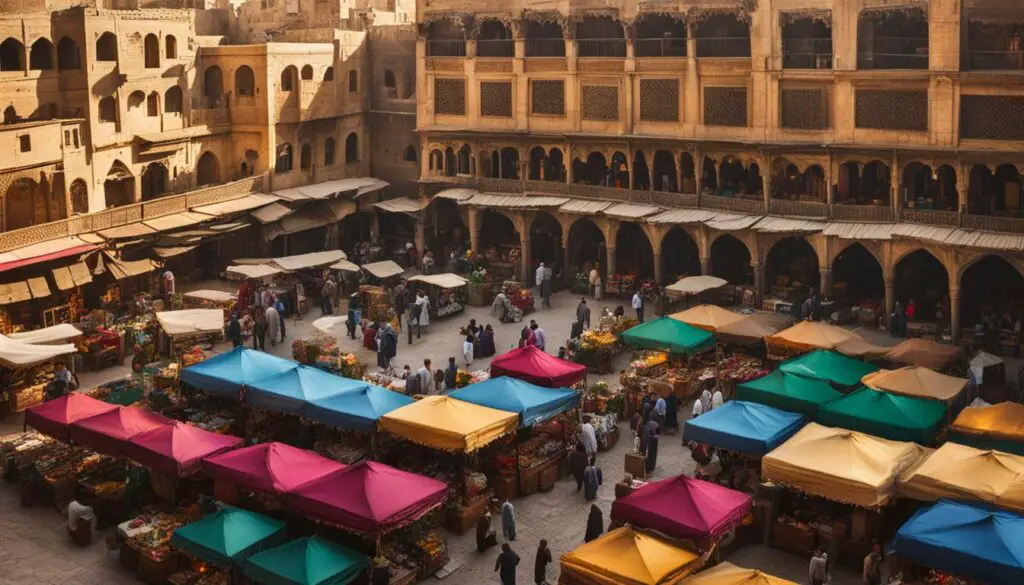
| Type | Location | Historical Significance |
|---|---|---|
| Al-Hussein Mosque | Adjacent to Khan El Khalili | A prominent Islamic pilgrimage site and symbol of religious importance. |
| Al-Azhar | Within walking distance of the bazaar | One of the oldest Islamic universities in the world, known for its prestigious scholarship and historical significance. |
| Wekalet El Ghouri | Nearby, in Al-Azhar area | A UNESCO World Heritage site, featuring stunning Mamluk architecture and hosting cultural performances. |
Discovering Unique Egyptian Souvenirs at the Bazaar
If you’re looking for one-of-a-kind Egyptian souvenirs and gifts, look no further than Khan El Khalili Bazaar. This iconic market in Cairo is a treasure trove of authentic Egyptian products and traditional crafts.
At Khan El Khalili, visitors can immerse themselves in the vibrant atmosphere and explore a wide range of unique items. From intricate jewelry and beautiful textiles to exquisite pottery and handmade carpets, the bazaar offers a plethora of options for those seeking memorable souvenirs.
When shopping at Khan El Khalili, you’ll discover the true essence of Egyptian culture. The bazaar is known for its craftsmanship and showcases the skills of local artisans. Each item tells a story and reflects the rich heritage of Egypt.
Whether you’re looking for a special gift for a loved one or a memento to remind you of your visit to Cairo, Khan El Khalili Bazaar is the place to find unique and authentic Egyptian souvenirs. Take your time to explore the winding alleys and let the bazaar’s charm guide you to the perfect treasure.
Discover the magic of Khan El Khalili and bring home a piece of Egyptian culture with these exceptional souvenirs.
Architectural Wonders of Khan El Khalili
Khan El Khalili’s architecture showcases the time-weathered beauty and Islamic influence that is deeply ingrained in its cultural heritage. The bazaar’s structural design is a testament to Egypt’s rich history and serves as a visual masterpiece amidst the bustling marketplace.
Islamic Influence on the Bazaar’s Structural Design
The architectural style of Khan El Khalili is heavily influenced by Islamic design principles. Intricate carvings, geometric patterns, and decorative tile work are prominent features of the bazaar’s buildings. These elements not only add to the aesthetic appeal but also reflect the religious and cultural significance of Islamic Cairo.
Mamluk and Ottoman Eras: A Melting Pot of Styles
During the Mamluk and Ottoman eras, Khan El Khalili experienced a fusion of architectural styles. The buildings in the bazaar showcase a harmonious blend of Mamluk and Ottoman influences, creating a unique and visually captivating atmosphere. This melding of different architectural traditions adds to the eclectic charm of Khan El Khalili.
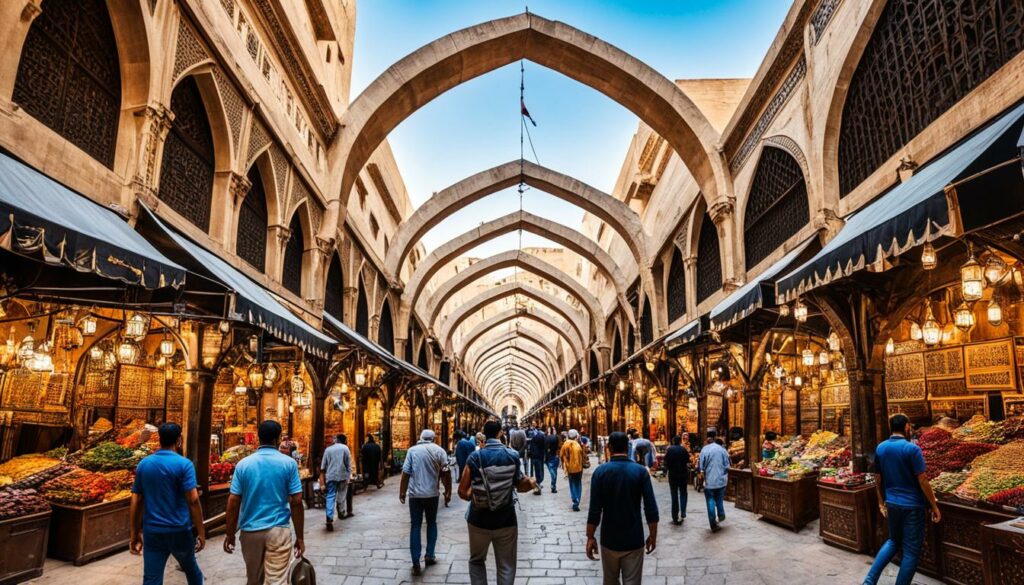
Time-Weathered Beauty Amidst a Bustling Marketplace
One cannot help but appreciate the time-weathered beauty of Khan El Khalili’s architecture. The aged structures, with their intricate details and architectural craftsmanship, stand as a testament to the bazaar’s enduring allure. Amidst the vibrant market stalls and bustling activity, the architectural wonders of Khan El Khalili exude an old-world charm that transports visitors back in time.
A Guide to Haggling in the Khan El Khalili Market
Haggling is a common practice in Khan El Khalili Bazaar. It is an integral part of the shopping experience, allowing visitors to negotiate and get the best price for their desired items. To help you navigate the art of haggling effectively, here are some valuable tips and techniques to keep in mind:
- Start with a lower offer: When engaging in a haggling session, it’s important to begin with a price significantly lower than the listed price. This leaves room for negotiation and sets the foundation for a potential bargain.
- Know the item’s value: Do your research before visiting the bazaar. Understand the typical price ranges for the items you’re interested in buying. This knowledge will help you gauge the fairness of the seller’s initial price and make informed counteroffers.
- Be willing to walk away: Remember that haggling is a two-way street. If the seller’s price is not meeting your expectations or budget, be prepared to walk away. This tactic can often entice the seller to reconsider and potentially lower the price to keep your business.
- Stay polite and respectful: Building a rapport with the seller is crucial during the negotiation process. Maintain a friendly and respectful attitude, even when bargaining. This approach can lead to a more favorable outcome and strengthen the chances for a successful deal.
- Bundle items for better deals: If you’re interested in multiple items from the same seller, consider bundling them together to negotiate a better overall price. This tactic can be especially effective when dealing with more expensive or luxurious items.
- Use cash: Cash payments can provide you with an advantage when haggling. Many sellers may prefer cash transactions and could be more willing to lower the price to secure an immediate sale.
- Be prepared to compromise: Haggling is all about finding a middle ground. While getting the best price is the goal, it’s important to be open to some level of compromise. Consider the value of the item, its rarity, and your personal budget when deciding on a final price.
By following these haggling tips and techniques, you can enhance your Khan El Khalili shopping experience and master the art of bargaining. Remember to approach negotiations with confidence and a willingness to explore different options. With practice, you’ll become adept at securing the best prices for your desired items while also enjoying the unique charm of this historic market.
Best Times to Embark on Your Khan El Khalili Adventure
Planning a visit to Khan El Khalili Bazaar? Timing can play a crucial role in enhancing your experience at this iconic Cairo marketplace. Whether you’re looking to beat the crowds, capture stunning photos, or immerse yourself in the vibrant cultural festivities, choosing the right time can make all the difference.
Early Mornings: Beating the Crowds and Capturing Photos
For those seeking a more serene and intimate experience, early mornings are the best time to explore Khan El Khalili. The market begins to come alive with activity, with shop owners arranging their vibrant wares for display. As you stroll through the alleys, you’ll have a chance to admire the intricate architecture and intricate details without the hustle and bustle of the later hours. The early morning light also provides the perfect backdrop for capturing stunning photos of the bazaar’s charm and authenticity.
Evening Visits: Experience the Bazaar’s Transformation
If you prefer a livelier ambiance, visit Khan El Khalili in the evenings. As the sun sets and the lights come on, the bazaar undergoes a magical transformation. The atmosphere becomes even more energetic, with the bustling marketplace offering a feast for the senses. Explore the winding alleys filled with the scent of aromatic spices and the sounds of traditional music. Engage with the locals, shop for unique souvenirs, and witness the vibrant energy of Cairo’s cultural hub.
Festivities and Events: Sufi Celebrations and Cultural Shows
Throughout the year, Khan El Khalili hosts a variety of cultural festivities and events that showcase the rich heritage of Egypt. From Sufi celebrations to traditional music and dance performances, there’s always something special happening in the bazaar. These events provide visitors with a deeper understanding of Egyptian culture and traditions. Keep an eye out for announcements or ask the locals for recommendations to make the most of your visit.
Whether you choose to explore Khan El Khalili in the early mornings, evenings, or during cultural festivities, each time of the day offers a unique experience. Take advantage of the best times to tailor your visit to your preferences and create unforgettable memories in this historic marketplace.
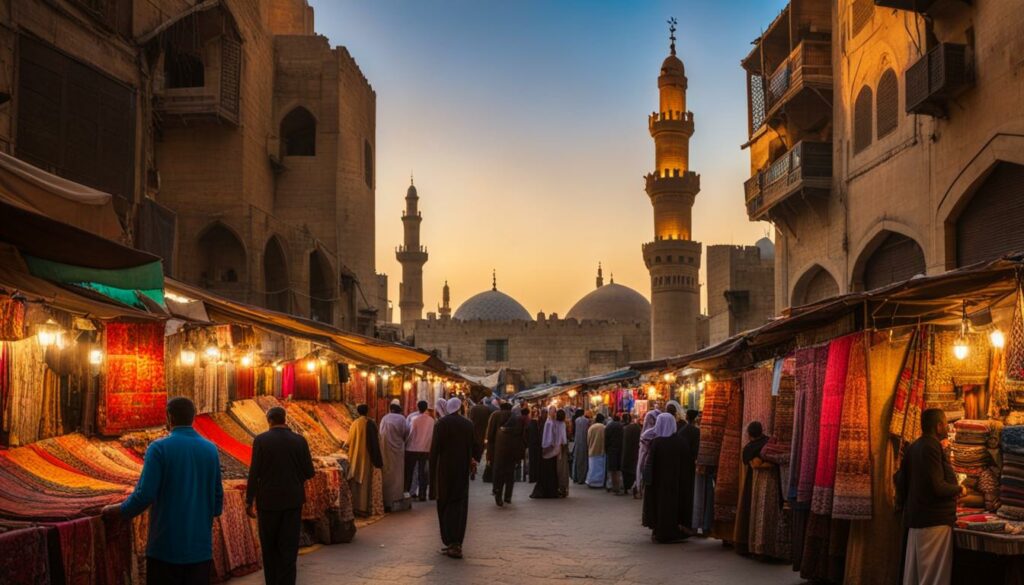
Historical Overview of Khan El Khalili
Khan El Khalili has a rich history that dates back centuries. From its humble beginnings as a burial site to its transformation into a thriving market, this iconic bazaar has been at the heart of Cairo’s trade and commerce.
Khan El Khalili: From Burial Site to Thriving Market
The story of Khan El Khalili begins in the 14th century when it was established as a burial site for members of the ruling Mamluk dynasty. However, it didn’t take long for the area to evolve into a bustling market, attracting merchants from all over the world. Over time, the market grew in size and importance, becoming a vibrant hub of trade and cultural exchange.
The Evolution of Trade Within the Bazaar’s Alleys
Throughout its history, Khan El Khalili has witnessed the evolution of trade. The bazaar’s narrow alleys have been the meeting point for merchants selling goods ranging from spices and textiles to jewelry and traditional crafts. While the types of products may have changed over the years, the spirit of commerce and exchange has remained constant, making Khan El Khalili a testament to the resilience and adaptability of marketplaces through time.
Maintaining Traditions Amidst Modern Commerce
Despite the modernization and commercialization of Cairo’s economy, Khan El Khalili has managed to maintain its traditions and cultural heritage. The bazaar is a place where craftsmanship is cherished, with skilled artisans continuing to produce traditional goods by hand. Visitors can still find unique souvenirs and immerse themselves in the vibrant atmosphere of this historic market.
Strolling Through Khan El Khalili: A Sensory Journey
Walking through Khan El Khalili Bazaar is a sensory journey. As you step into the bustling marketplace, you are immediately enveloped in a vibrant and lively atmosphere. The sights, sounds, and smells create an immersive experience that awakens your senses.
The bazaar is a kaleidoscope of colors, with shops adorned in vibrant fabrics, intricate carpets, and shimmering jewelry. Every corner reveals a new palette of hues, inviting you to explore and discover the rich tapestry of Egyptian crafts and products. The vibrant colors create a visual feast that adds to the allure of Khan El Khalili.
The aroma of aromatic spices fills the air, enticing you to sample the flavors of Egypt. As you walk through the alleys, the fragrances of cumin, cardamom, and saffron mingle with the exotic scents of incense and perfumes. The tantalizing smell of freshly brewed coffee drifts from historic cafes, beckoning you to take a moment and savor the sensory delights.
Amidst the bustling crowd, the rhythmic beats of traditional music can be heard. Musicians playing the oud, darbuka, and ney create a melodic backdrop that adds to the authenticity of the bazaar. The soothing sounds of Islamic music transport you to another time, harmonizing with the vibrant atmosphere of Khan El Khalili.
Let your senses guide you as you stroll through Khan El Khalili Bazaar, immersing yourself in a sensory experience like no other. The bustling atmosphere, vibrant colors, aromatic spices, and traditional music intertwine to create a truly unforgettable journey through the heart of Islamic Cairo.
Mosque Architecture and Islamic Heritage Near Khan El Khalili
Near Khan El Khalili, there are significant mosques and cultural landmarks that showcase the rich Islamic heritage of the area. Visitors can explore the architectural beauty of these mosques and immerse themselves in the cultural splendor they offer.
Al-Hussein Mosque: A Beacon of Islamic Architecture
One of the prominent mosques near Khan El Khalili is Al-Hussein Mosque. It is a stunning example of Islamic architecture, known for its intricate designs and elegant minarets. The mosque holds religious significance as it is believed to house the head of Imam Hussein, making it an important pilgrimage site for Muslims.
Wekalet El Ghouri and Al-Azhar: Hubs of Cultural Splendor
Other notable cultural landmarks near Khan El Khalili include Wekalet El Ghouri and Al-Azhar Mosque. Wekalet El Ghouri is a historic caravanserai that now serves as a venue for cultural performances and events, providing a glimpse into Egypt’s traditional arts and entertainment. Al-Azhar Mosque, on the other hand, is one of the oldest universities in the world and a center of Islamic learning, attracting scholars and students from around the globe.
Visiting these mosques and cultural landmarks near Khan El Khalili offers a unique opportunity to appreciate the stunning mosque architecture and delve into the Islamic heritage that has shaped Egypt’s cultural identity.
From Incense to Handmade Carpets: The Rich Merchandise of Khan El Khalili
Khan El Khalili Bazaar offers a rich variety of merchandise, making it a paradise for shoppers seeking traditional crafts, jewelry, textiles, and more. From the moment visitors step into the bustling market, they are greeted with a vibrant array of goods that showcase the artistry and cultural heritage of Egypt.
One of the highlights of Khan El Khalili is its wide selection of incense. The air is filled with a captivating mix of fragrances, creating an enchanting atmosphere as visitors explore the alleys. The market is renowned for its collection of unique scents, offering an opportunity for shoppers to bring the captivating aromas of the Middle East back home.
Another gem of Khan El Khalili’s merchandise is its exquisite handmade carpets. Crafted with meticulous attention to detail, these carpets represent centuries-old weaving techniques passed down through generations. Visitors have the opportunity to admire and acquire these masterpieces, which blend exceptional craftsmanship with timeless beauty.
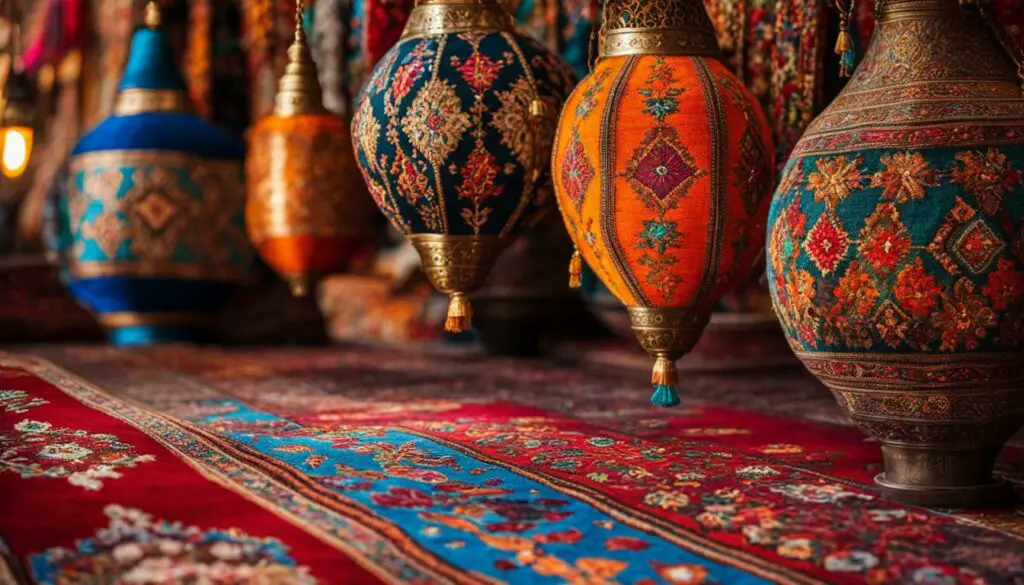
The bazaar also showcases a wide range of traditional crafts, including intricately designed jewelry. From delicate silver bracelets to elaborate gold necklaces, visitors can find unique pieces that pay homage to Egypt’s rich history and cultural traditions.
Textiles are another highlight of Khan El Khalili’s merchandise. The market is filled with vibrant fabrics and embroidered textiles that reflect Egypt’s diverse heritage. Visitors can discover beautifully crafted garments, scarves, and tapestries that embody the country’s unique weaving techniques and artistic traditions.
Whether it’s the scent of incense, the allure of handmade carpets, the beauty of traditional crafts, or the richness of jewelry and textiles, Khan El Khalili Bazaar offers a truly captivating shopping experience. Visitors can immerse themselves in the rich cultural tapestry of Egypt and find one-of-a-kind treasures to cherish for a lifetime.
Culinary Delights and Historic Cafes in Khan El Khalili
El-Fishawi Cafe: A Portal to the Past
Khan El Khalili is not only a market but also a destination for culinary delights. One of the iconic historic cafes in the bazaar is El-Fishawi Cafe, which has been serving locals and tourists for over 200 years. Stepping into El-Fishawi Cafe is like stepping back in time, with its charming vintage interior and traditional decor. The cafe has retained its authentic atmosphere and continues to attract visitors seeking a cultural dining experience.
El-Fishawi Cafe is famous for its variety of teas, aromatic coffees, and flavorful shishas (water pipes). It offers a cozy and inviting space where visitors can relax and soak in the ambiance of the bazaar. As you sip on your tea or coffee, you can observe the bustling activity of Khan El Khalili and marvel at the historic surroundings.
Located in the heart of Islamic Cairo, El-Fishawi Cafe is a cultural institution that has witnessed the passing of time and the evolution of the bazaar. It has served as a meeting place for artists, writers, and intellectuals throughout history. Today, it continues to be a beloved spot for locals and tourists alike, providing a glimpse into the culinary traditions of Egypt.
Sampling Traditional Egyptian Cuisine Amidst History
In addition to historic cafes, Khan El Khalili offers a wide array of options for sampling traditional Egyptian cuisine. The bazaar is home to numerous restaurants and food stalls that serve authentic dishes showcasing the rich flavors of Egypt.
Visitors can indulge in mouthwatering Egyptian street food such as koshari, a popular comfort food made with rice, lentils, pasta, and a flavorful tomato sauce. For those who prefer a meaty delight, shawarma and kebabs are popular choices. The aromas of freshly baked bread, spices, and aromatic herbs waft through the air, enticing passersby to indulge in the culinary delights.
With the blend of historic atmosphere and traditional flavors, dining in Khan El Khalili allows visitors to not only satisfy their appetite but also immerse themselves in the culture and heritage of Egypt. It offers a unique culinary experience where tradition and history intertwine.
Planning Your Visit: Transportation and Accessibility
When planning your visit to Khan El Khalili, it’s important to consider transportation options and ensure easy accessibility to this iconic bazaar. Whether you prefer public transport or a more personalized journey, there are transportation tips to make your visit seamless and convenient.
Navigating to Khan El Khalili: Public Transport Tips
If you opt for public transport, there are several options available to reach Khan El Khalili. Cairo’s extensive public transport network includes buses and the Cairo Metro, which offers a convenient way to travel around the city. The Attaba or Hussein metro stations are located near the bazaar, allowing easy access for visitors.
It’s advisable to check the Cairo Metro schedule for any changes or updates before your visit. Taking the metro can be a cost-effective and efficient way to reach Khan El Khalili, especially during peak hours when traffic congestion is high.
Taxi and Private Transport: A More Personalized Journey
If you prefer a more personalized journey with added convenience, taxis and private transport services are readily available in Cairo. Hailing a taxi is a common mode of transportation in the city, and you can easily find taxis near popular landmarks, hotels, and tourist attractions.
When taking a taxi, remember to negotiate the fare beforehand and ensure that the meter is used for an accurate calculation. It can be helpful to have the address or name of Khan El Khalili written down in Arabic to show the driver.
Alternatively, booking a private transport service or hiring a driver for the day can provide a comfortable and hassle-free experience. This option allows you to customize your itinerary and have the flexibility to explore other attractions in Cairo at your own pace.
Ultimately, the choice of transportation depends on your preferences and travel needs. Consider factors such as cost, convenience, and the level of personalization you desire to make the most of your visit to Khan El Khalili.
Khan El Khalili: An Unforgettable Shopping Destination
Khan El Khalili Bazaar in Cairo, Egypt, is a shopping destination like no other. With its vibrant atmosphere, rich cultural experience, and historical significance, it offers a truly unforgettable journey for visitors.
Step into Khan El Khalili and immerse yourself in the sights, sounds, and scents of this historic market. The bustling alleys are adorned with traditional crafts, jewelry, textiles, and more, showcasing the finest of Egyptian craftsmanship. From intricately carved statues to handwoven carpets, you’ll find a wide variety of unique souvenirs to bring back home.
But Khan El Khalili is not just about shopping; it’s an opportunity to delve into the cultural heritage of Cairo. As you explore the market’s alleys, you’ll witness the centuries-old traditions of the Middle Eastern market come to life. Traditional music fills the air, and the vibrant colors of the handmade goods create a feast for the senses.
Whether you’re a history enthusiast, an art lover, or simply seeking a one-of-a-kind shopping experience, Khan El Khalili Bazaar is a must-visit destination. Discover the charm of this historic market, soak in the cultural ambiance, and take home a piece of Egyptian culture with you.
FAQ
Q: What is Khan El Khalili?
A: Khan El Khalili is a historical bazaar located in Cairo, Egypt. It is a vibrant marketplace known for its unique shopping experience and cultural significance.
Q: When was Khan El Khalili founded?
A: Khan El Khalili was founded in the 14th century by Emir Djaharks el-Khalili as a trading center for merchants from Egypt and around the world.
Q: What can I find at Khan El Khalili Bazaar?
A: Khan El Khalili offers a wide range of traditional crafts, jewelry, textiles, pottery, and other unique Egyptian souvenirs and gifts.
Q: What is the architecture like at Khan El Khalili?
A: The architecture at Khan El Khalili reflects the rich cultural heritage of Egypt, with influences from Islamic design principles and a fusion of styles from the Mamluk and Ottoman eras.
Q: Is haggling common in Khan El Khalili?
A: Yes, haggling is a common practice in Khan El Khalili Bazaar. Visitors can negotiate prices by starting with a lower offer and being knowledgeable about the item’s value.
Q: What are the best times to visit Khan El Khalili?
A: The best times to visit Khan El Khalili are early mornings to beat the crowds, evenings to experience the market’s transformation with lights, and during cultural festivities and events.
Q: What is the historical significance of Khan El Khalili?
A: Khan El Khalili has a rich history, evolving from a burial site to a thriving market. It has maintained its traditions amidst modern commerce, making it a symbol of the city’s historic trading hub.
Q: What can I expect during my visit to Khan El Khalili?
A: During your visit, you can expect a sensory journey through the bustling atmosphere, vibrant colors, aromatic spices, and the sounds of traditional music that create an immersive experience.
Q: Are there any significant landmarks near Khan El Khalili?
A: Near Khan El Khalili, you can explore the architectural beauty of Al-Hussein Mosque and the cultural splendor of Wekalet El Ghouri and Al-Azhar.
Q: What type of merchandise can I find at Khan El Khalili?
A: Khan El Khalili offers a rich variety of merchandise, ranging from incense to handmade carpets, traditional crafts, jewelry, textiles, and more.
Q: Can I sample traditional Egyptian cuisine at Khan El Khalili?
A: Yes, you can sample traditional Egyptian cuisine at historic cafes like El-Fishawi Cafe while immersing yourself in the market’s rich history.
Q: How can I plan my visit to Khan El Khalili?
A: You can plan your visit by considering transportation options such as public transport, taxis, or private transport for a more personalized journey.
Q: What makes Khan El Khalili an unforgettable shopping destination?
A: Khan El Khalili offers a unique cultural experience, historical significance, and the opportunity to explore traditional crafts and find unique souvenirs, making it a top shopping destination.
